New York City, November 10th-12th, 2023
-
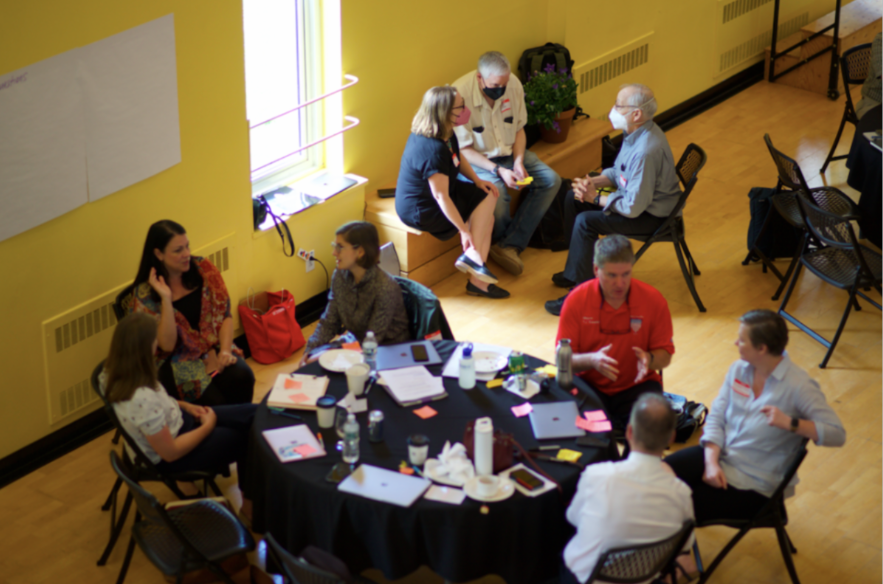 Who is this workshop for?There are multiple types of participants for this workshop, and there will be a variety of sessions.
Who is this workshop for?There are multiple types of participants for this workshop, and there will be a variety of sessions.
1) Elected officials/public servants considering deliberative or participatory processes
2) Educators/students looking to implement democratic curriculum in their classroom/schools
3) Advocates for a more responsive and collaborative democracy
4) Facilitators looking to deepen their skills at running participatory processes
(such as Participatory Budgeting or Citizens' Assemblies)
Participants will be able to pick and choose those workshops that are most compelling to them.- Apply here and email [email protected] with any questions
-
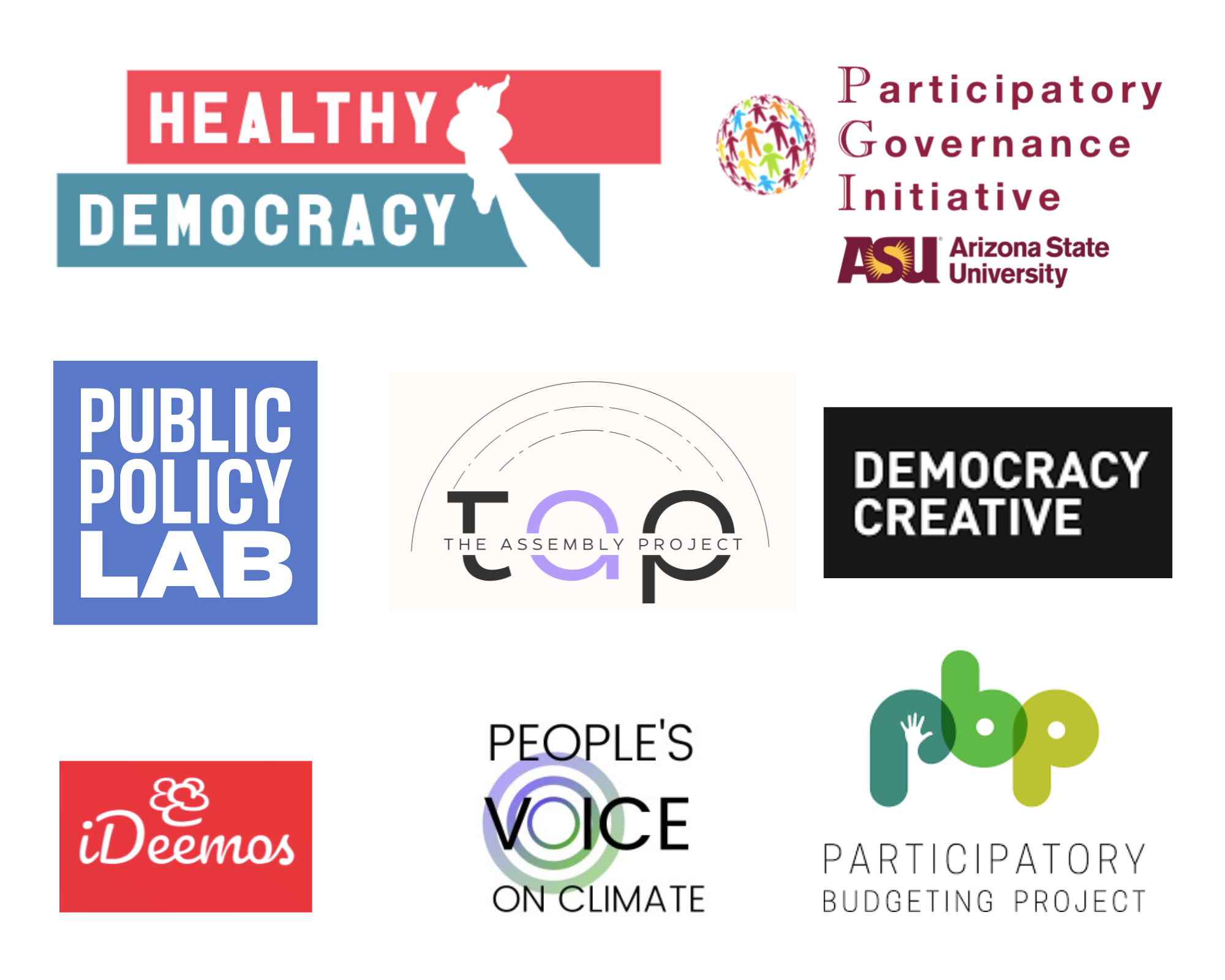 Who is leading the workshops?
Who is leading the workshops?You will learn from the foremost experts from the U.S. and around the world regarding their experiences in using random selection and deliberative methods. They will provide you with both the broad political framework and practical considerations needed to design and implement a participatory and deliberative project.
-
What is a citizens' assembly?Democracy is much more than elections. Citizen assemblies bring together a cross-section of everyday people, have them learn about all sides of an issue, and form policy recommendations that go beyond partisan politics. Such deliberative bodies have been held on nearly ever policy issue, from healthcare and pensions in Chile to abortion in Ireland, or electoral reform in Canada. Paris, Milan and Brussels have even established permanent assemblies at the local level. Such assemblies point to a deeply human tradition of deliberation that cuts across cultures and has deep roots around the world, from ancient India to ancient Athens.
-
 Daniel SchugurenskyDaniel Schugurensky is a professor in the School of Public Affairs and in the School of Social Transformation at Arizona State University. He is the founding director of the Participatory Governance Initiative and coordinator of the graduate certificate in participatory governance and the masters program of social and cultural pedagogy. Among his authored or edited books are School participatory budgeting: A new approach to citizenship education (Edward Elgar; forthcoming 2023); By the People: Participatory Democracy, Civic Engagement and Citizenship Education (Participatory Governance Initiative 2017); Learning Citizenship by practicing democracy: International initiatives and perspectives (Cambridge Scholarly Press 2010). He is guest co-editor of Participatory Budgeting: Accomplishments, Challenges and Prospects (Journal of Local Development and Society, 2023). He has published over 100 articles, book chapters and technical reports on a variety of topics, including adult education, community development, participatory democracy, citizenship education, social economy, civic engagement, higher education, migration, and volunteer work. Among his recent articles are Inclusive civic education and school democracy through participatory budgeting (Education, Citizenship and Social Justice 2023); Does School Participatory Budgeting Increase Students’ Political Efficacy? Bandura’s ‘Sources’, Civic Pedagogy, and Education for Democracy (Curriculum and Teaching 2021); and Participatory budgeting, civic education, and political capital (Springer 2019).
Daniel SchugurenskyDaniel Schugurensky is a professor in the School of Public Affairs and in the School of Social Transformation at Arizona State University. He is the founding director of the Participatory Governance Initiative and coordinator of the graduate certificate in participatory governance and the masters program of social and cultural pedagogy. Among his authored or edited books are School participatory budgeting: A new approach to citizenship education (Edward Elgar; forthcoming 2023); By the People: Participatory Democracy, Civic Engagement and Citizenship Education (Participatory Governance Initiative 2017); Learning Citizenship by practicing democracy: International initiatives and perspectives (Cambridge Scholarly Press 2010). He is guest co-editor of Participatory Budgeting: Accomplishments, Challenges and Prospects (Journal of Local Development and Society, 2023). He has published over 100 articles, book chapters and technical reports on a variety of topics, including adult education, community development, participatory democracy, citizenship education, social economy, civic engagement, higher education, migration, and volunteer work. Among his recent articles are Inclusive civic education and school democracy through participatory budgeting (Education, Citizenship and Social Justice 2023); Does School Participatory Budgeting Increase Students’ Political Efficacy? Bandura’s ‘Sources’, Civic Pedagogy, and Education for Democracy (Curriculum and Teaching 2021); and Participatory budgeting, civic education, and political capital (Springer 2019). -
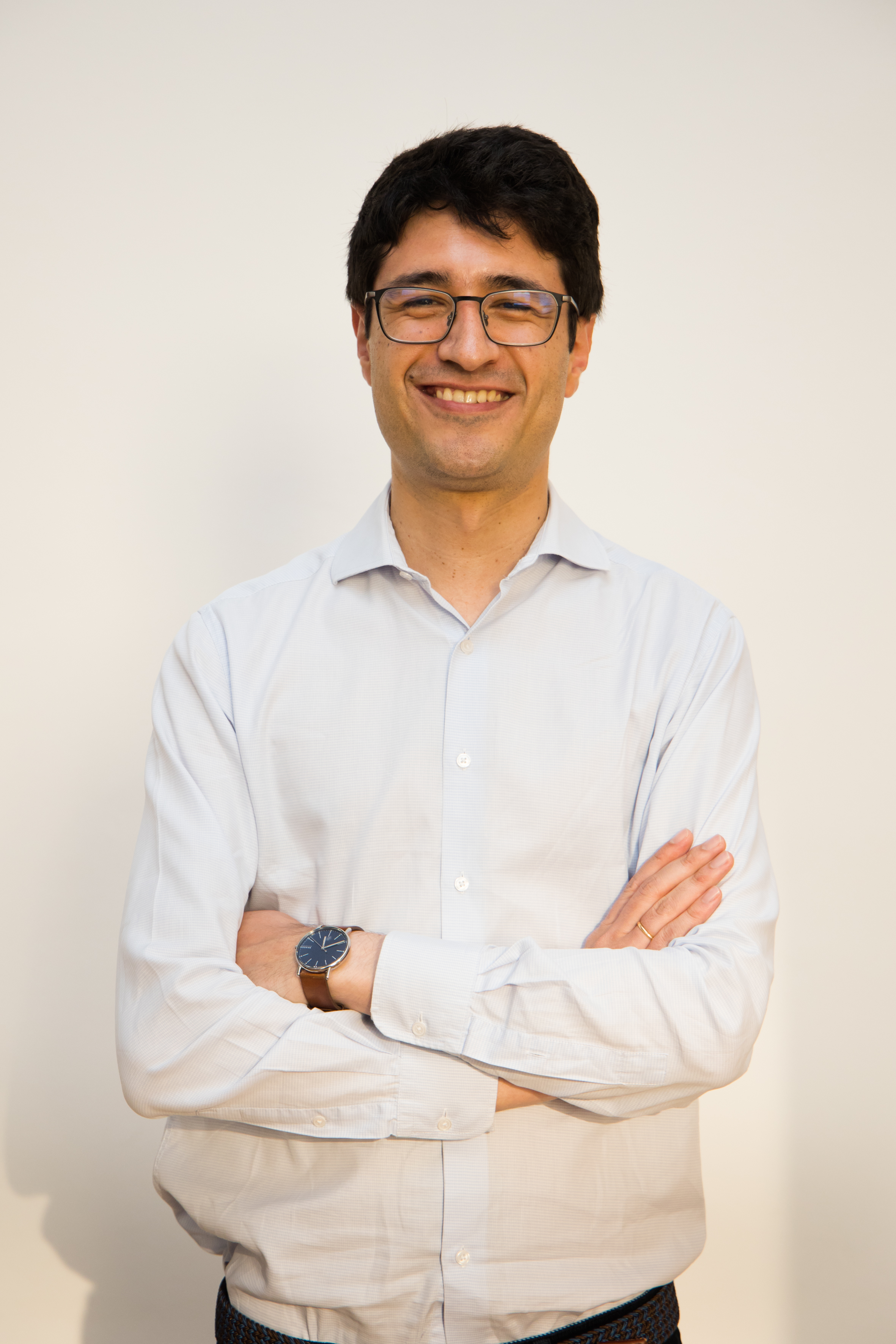 Felipe ReyProfessor of Public Law at the Pontificia Universidad Javeriana in Colombia. He holds a Ph.D. in Law from Pompeu Fabra University. During his academic career, he has taught public law and legal theory at universities in Colombia and Spain, and has been a visiting researcher at the Center for Human Values at Princeton University. He is also a founding partner and project coordinator of the democratic innovation laboratory ideemos.org, part of the international network Democracy R&D. He designed the Itinerant Citizens' Assembly model, the first model from the Global South to be recognized as an institutionalization alternative by the OECD in its recent report "Eight ways to institutionalize deliberative democracy". iDeemos participated as convener of the Spanish language cluster in the Global Assembly on the Climate Crisis in 2021. iDeemos is also leading, together with Democracy R&D, the global project "The New Frontiers of Deliberative Democracy", sponsored by the National Endowment for Democracy.
Felipe ReyProfessor of Public Law at the Pontificia Universidad Javeriana in Colombia. He holds a Ph.D. in Law from Pompeu Fabra University. During his academic career, he has taught public law and legal theory at universities in Colombia and Spain, and has been a visiting researcher at the Center for Human Values at Princeton University. He is also a founding partner and project coordinator of the democratic innovation laboratory ideemos.org, part of the international network Democracy R&D. He designed the Itinerant Citizens' Assembly model, the first model from the Global South to be recognized as an institutionalization alternative by the OECD in its recent report "Eight ways to institutionalize deliberative democracy". iDeemos participated as convener of the Spanish language cluster in the Global Assembly on the Climate Crisis in 2021. iDeemos is also leading, together with Democracy R&D, the global project "The New Frontiers of Deliberative Democracy", sponsored by the National Endowment for Democracy. -
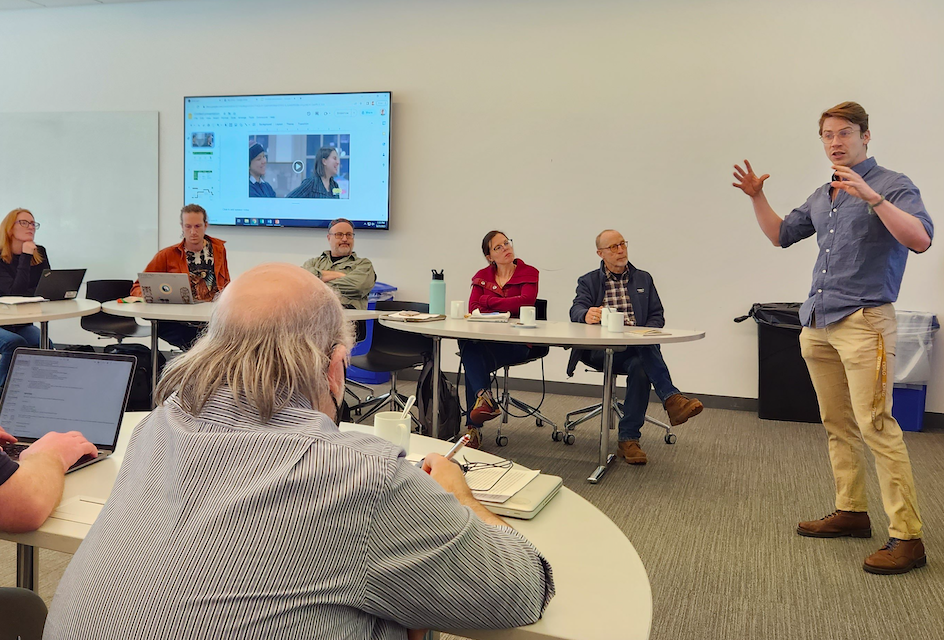 Forrest SparksForrest's work is centered on community-led design for regenerative civic, economic, and ecological systems. He was the Lead Process Designer for the NYC Civic Engagement Commission’s first citywide Deliberative Participatory Budgeting Process. He founded The Assembly Project in 2023 to advocate for more ambitious deliberative processes in NYC. Other previous work includes leveraging anchor institutions in co-designing solidarity economies and developing a strategy for global community health worker programs with the International Rescue Committee. He will be teaching the course Design for Democracy at the New School in Spring 2024.
Forrest SparksForrest's work is centered on community-led design for regenerative civic, economic, and ecological systems. He was the Lead Process Designer for the NYC Civic Engagement Commission’s first citywide Deliberative Participatory Budgeting Process. He founded The Assembly Project in 2023 to advocate for more ambitious deliberative processes in NYC. Other previous work includes leveraging anchor institutions in co-designing solidarity economies and developing a strategy for global community health worker programs with the International Rescue Committee. He will be teaching the course Design for Democracy at the New School in Spring 2024.
-
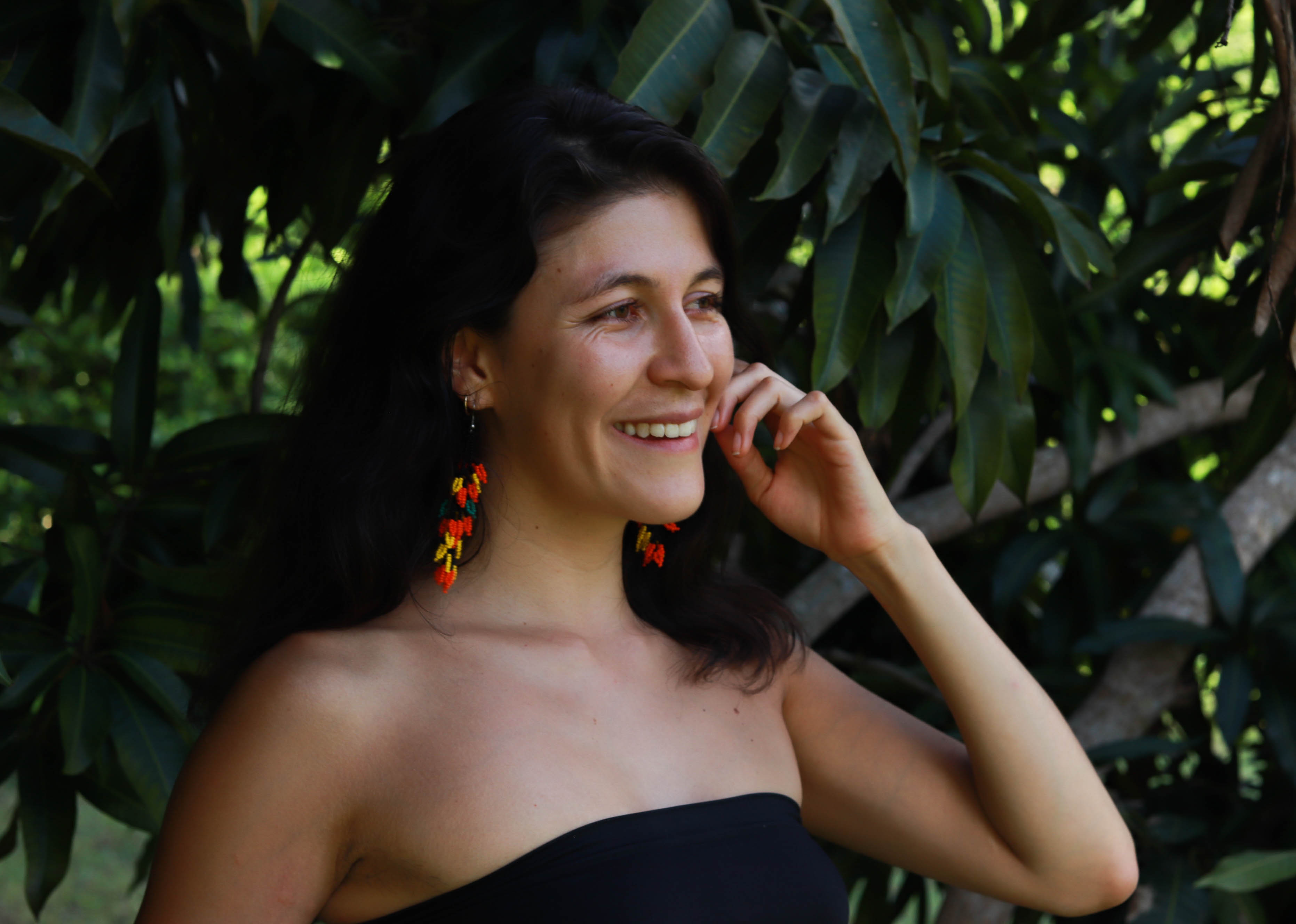 María Alejandra Victorino JiménezMaría Alejandra Victorino is an industrial engineer who focuses on the design of public policy from a systemic approach, with special interest in territorial justice and the Colombian Pacific. She currently works as Coordinator of Political Advocacy at the Open Policy Institute in Colombia, where she leads strategies to strengthen leadership and organizations to occupy and inhabit power, through public innovation laboratories, methodologies for citizen participation, deliberative democracy tools and civic technology. Among the projects he works on are the itinerant Citizen Assembly in Bogota, Demolab, Alliance for the Transformation of Congress and Deliberatura - a deliberation platform in Buenventura.
María Alejandra Victorino JiménezMaría Alejandra Victorino is an industrial engineer who focuses on the design of public policy from a systemic approach, with special interest in territorial justice and the Colombian Pacific. She currently works as Coordinator of Political Advocacy at the Open Policy Institute in Colombia, where she leads strategies to strengthen leadership and organizations to occupy and inhabit power, through public innovation laboratories, methodologies for citizen participation, deliberative democracy tools and civic technology. Among the projects he works on are the itinerant Citizen Assembly in Bogota, Demolab, Alliance for the Transformation of Congress and Deliberatura - a deliberation platform in Buenventura. -
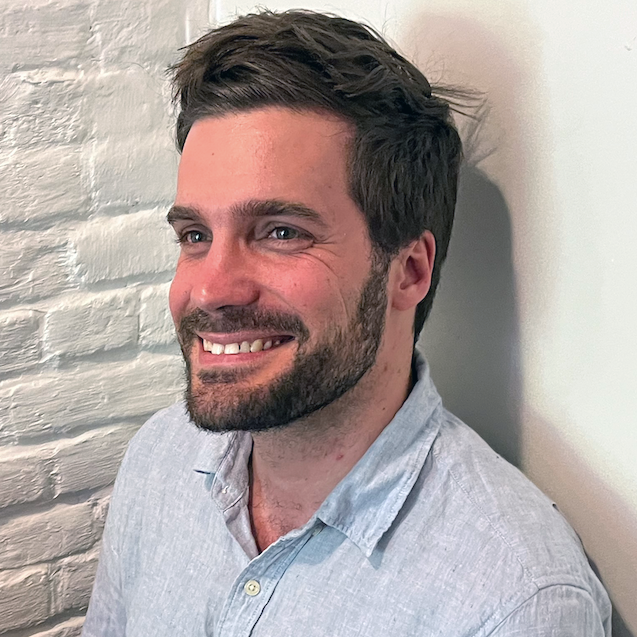 Philip LindsayPhilip leads the Democracy Innovation Hub at the Arendt Center, where he develops the vision for our workshops and network of practitioners, public servants and educators. He received his BA from Temple University in Latin American Studies.
Philip LindsayPhilip leads the Democracy Innovation Hub at the Arendt Center, where he develops the vision for our workshops and network of practitioners, public servants and educators. He received his BA from Temple University in Latin American Studies. -
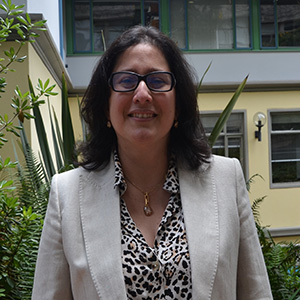 Andrea CeleminPhD in Law from the Universidad de los Andes. Lawyer, Faculty of Law, Political and Social Sciences of the National University of Colombia, with a Master's Degree in Law from the same University. Professor of Legislation and Public Policies, Judge and Constitutional Interpretation, Public Administrative Law and State Contracts at the Law School of the Universidad de los Andes.
Andrea CeleminPhD in Law from the Universidad de los Andes. Lawyer, Faculty of Law, Political and Social Sciences of the National University of Colombia, with a Master's Degree in Law from the same University. Professor of Legislation and Public Policies, Judge and Constitutional Interpretation, Public Administrative Law and State Contracts at the Law School of the Universidad de los Andes. -
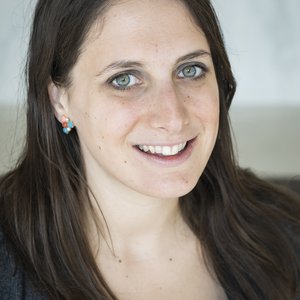 Hollie Russon GilmanHollie Russon Gilman is a Political Reform program Senior Fellow at New America and an Affiliate Fellow at Harvard's Ash Center for Democratic Governance and Innovation. Her work focuses on topics at the intersection of civic engagement, digital technology, and governance. Her research looks at building a more equitable, inclusive, and genuine multi-racial, multi-ethnic democracy. This includes exploring participatory innovation, civic infrastructure, cities, and the opportunities and challenges of digital technologies to enhance governance and generate more equitable public policy. She led the working group to build a Trust for Civic Infrastructure from the American Academy of Arts and Sciences’ Our Common Purpose report. Russon Gilman's first book is Democracy Reinvented: Participatory Budgeting and Civic Innovation and America as part of the Harvard Kennedy School's series on governance innovation in the 21st century. Most recently, Dr. Gilman also co-authored a book with Sabeel Rahman, Civic Power: Rebuilding American Democracy in an Era of Crisis with Cambridge University Press.
Hollie Russon GilmanHollie Russon Gilman is a Political Reform program Senior Fellow at New America and an Affiliate Fellow at Harvard's Ash Center for Democratic Governance and Innovation. Her work focuses on topics at the intersection of civic engagement, digital technology, and governance. Her research looks at building a more equitable, inclusive, and genuine multi-racial, multi-ethnic democracy. This includes exploring participatory innovation, civic infrastructure, cities, and the opportunities and challenges of digital technologies to enhance governance and generate more equitable public policy. She led the working group to build a Trust for Civic Infrastructure from the American Academy of Arts and Sciences’ Our Common Purpose report. Russon Gilman's first book is Democracy Reinvented: Participatory Budgeting and Civic Innovation and America as part of the Harvard Kennedy School's series on governance innovation in the 21st century. Most recently, Dr. Gilman also co-authored a book with Sabeel Rahman, Civic Power: Rebuilding American Democracy in an Era of Crisis with Cambridge University Press.
She served in the Obama White House as the Open Government and Innovation Advisor in the Office of Science and Technology Policy. She has served as an advisor and consultant to numerous foundations, companies, and non-profits. She holds a PhD and MA from Harvard's Department of Government as well as an A.B. from the University of Chicago with highest honors in political science.
Russon Gilman has published in numerous academic and popular audience publications including The International Studies Review; PS: Journal of Political Science and Politics, and the Journal of Public Deliberation.
Russon Gilman's popular writings have appeared in several news outlets including Axios, The Boston Globe, Foreign Affairs, NextCity, Slate, Stanford Social Innovation Review, TechCrunch, Vox, and The Washington Post.
-
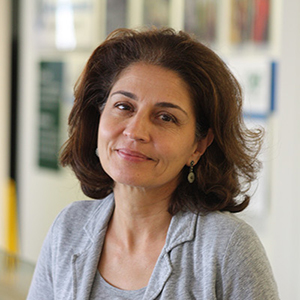 Marjan EhsassiMarjan H. Ehsassi is a strategic policy advisor, practitioner, movement builder, and a fierce believer in citizen-centric, inclusive, responsive and impactful government-led engagements that provide citizens with consequential voice in policy reform.
Marjan EhsassiMarjan H. Ehsassi is a strategic policy advisor, practitioner, movement builder, and a fierce believer in citizen-centric, inclusive, responsive and impactful government-led engagements that provide citizens with consequential voice in policy reform.
She has traveled to and worked to enhance space for civil society in some of the most complex environments including Iran, Ukraine, and North Korea. A lawyer and international governance expert, she received her Doctorate in International Affairs from SAIS, Johns Hopkins University, with a concentration on democratic innovations, deliberation and government-initiated citizens’ assemblies. She has studied the impact of citizens’ assemblies on participants in France, Belgium, Canada, and the United States.
Marjan is Strategic Director of the Democratic Action Fund and serves on several boards including Healthy Democracy, the American Friends Service Committee, and the Meridian Council. She was one of four guarantors selected to the Collège des Garants of the French Citizens’ Convention on the End of Life (Convention Citoyenne sur la Fin de Vie) (2022-2023) and is on the Oversight Committee of G1000’s We Need To Talk Citizens’ Panel (2022-2023).
As a Berggruen Future of Democracy Fellow, Marjan supports programs that raise knowledge, build capacity and test deliberative platforms in the United States, including the Global Innovations in Democracy Parliamentary Forum, the Summit of Democracy Working Group on Deliberative Democracy, the Future of Institutions on Deliberative Democracy, and the design and implementation of the Citizens’ Assemblies in the United States. -
 Laura BerryLaura Berry works at the intersections of democratic engagement and the Climate Emergency movement. She brings over a decade of experience in climate advocacy, organizing, and policy to the work of People’s Voice on Climate, and served as a Monitoring Team member and lead advisor to PVOC during the Washington State Climate Assembly before taking on the Director role. Laura holds a MS in Global Environment, Politics and Society from the University of Edinburgh and a B.A. in Human Ecology from College of the Atlantic.
Laura BerryLaura Berry works at the intersections of democratic engagement and the Climate Emergency movement. She brings over a decade of experience in climate advocacy, organizing, and policy to the work of People’s Voice on Climate, and served as a Monitoring Team member and lead advisor to PVOC during the Washington State Climate Assembly before taking on the Director role. Laura holds a MS in Global Environment, Politics and Society from the University of Edinburgh and a B.A. in Human Ecology from College of the Atlantic. -
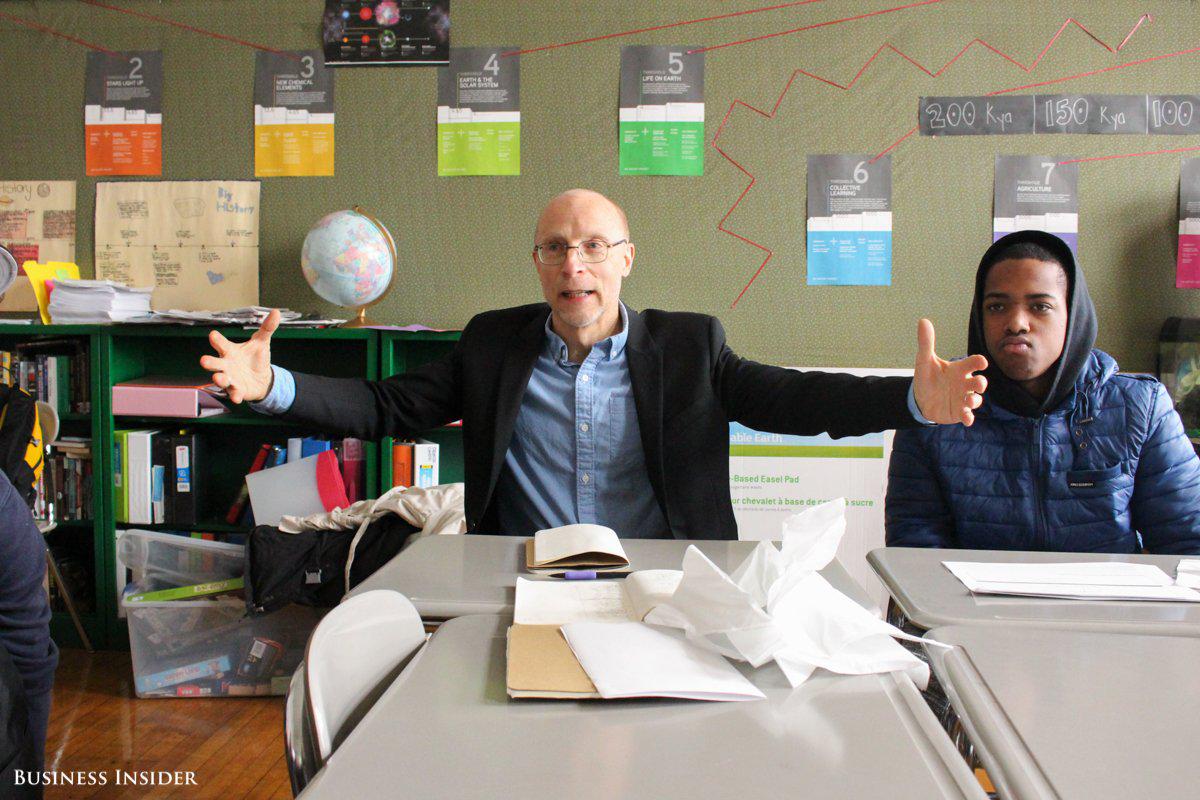 Scott HenstrandScott spent 27 years as a classroom teacher in Brooklyn, where he taught every grade from 1st through 12th. He won the Gaynor McCown award from NYC Outward Bound Schools in 2011. He is now researching and writing about building a democratic classroom. Henstrand was a Big History educator at Brooklyn Collaborative Studies. His main drive is to go from strict skill-building and content understanding for problem-solving to a striving to find meaning. Watch him in a short video on "From Measurement to Emergence" or read his article "Subverting the System: Student and Teacher as Equals."
Scott HenstrandScott spent 27 years as a classroom teacher in Brooklyn, where he taught every grade from 1st through 12th. He won the Gaynor McCown award from NYC Outward Bound Schools in 2011. He is now researching and writing about building a democratic classroom. Henstrand was a Big History educator at Brooklyn Collaborative Studies. His main drive is to go from strict skill-building and content understanding for problem-solving to a striving to find meaning. Watch him in a short video on "From Measurement to Emergence" or read his article "Subverting the System: Student and Teacher as Equals." -
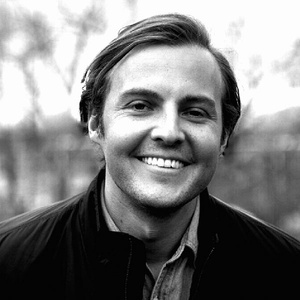 Jesse WarrenJesse has long worked at the crossroads of creativity and governance. He has been a music producer, designer, campaign staffer, and Capitol Hill aide, among other things. Frustrated by the lack of creative thinking he saw in government and politics, he started Democracy Creative in 2019 to bring these two realms together.
Jesse WarrenJesse has long worked at the crossroads of creativity and governance. He has been a music producer, designer, campaign staffer, and Capitol Hill aide, among other things. Frustrated by the lack of creative thinking he saw in government and politics, he started Democracy Creative in 2019 to bring these two realms together. -
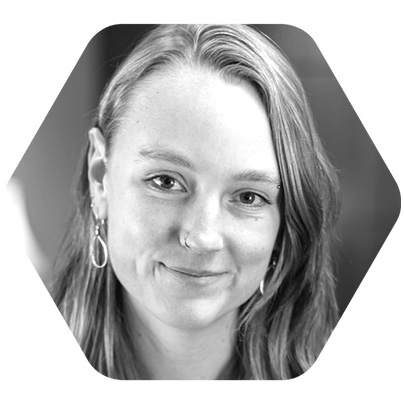 Alex RenirieAlex co-leads program development and process design at Healthy Democracy, a US-based nonpartisan nonprofit that brings together everyday people – selected by democratic lottery – to tackle tough policy questions. She co-coordinates HD's complex public processes and manages partnerships with deliberative democracy practitioners in the US and abroad. Since 2019, Alex has served on four Healthy Democracy projects in various capacities, including as a moderator, process designer, and project manager. She holds dual Masters degrees in Conflict & Dispute Resolution and Environmental Studies from the University of Oregon and a BA in Interdisciplinary Studies from the California Institute of Integral Studies. Prior to joining the Healthy Democracy team, she worked for over a decade in public policy advocacy and organizing.
Alex RenirieAlex co-leads program development and process design at Healthy Democracy, a US-based nonpartisan nonprofit that brings together everyday people – selected by democratic lottery – to tackle tough policy questions. She co-coordinates HD's complex public processes and manages partnerships with deliberative democracy practitioners in the US and abroad. Since 2019, Alex has served on four Healthy Democracy projects in various capacities, including as a moderator, process designer, and project manager. She holds dual Masters degrees in Conflict & Dispute Resolution and Environmental Studies from the University of Oregon and a BA in Interdisciplinary Studies from the California Institute of Integral Studies. Prior to joining the Healthy Democracy team, she worked for over a decade in public policy advocacy and organizing. -
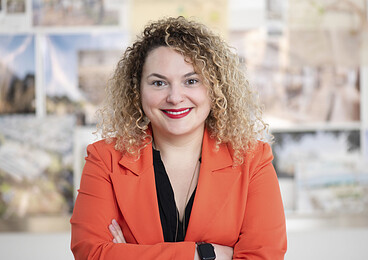 Işıl AkgülWith over a decade in the field, Isil Akgul has a global perspective on architecture alongside a deep knowledge of urban planning and sustainability. Passionate about coastal resiliency and circular economy strategies, Akgul has worked with the Waterfront Alliance and RETI Center in New York. An award-winning designer, she is also a fellow with the Urban Design Forum (UDF) and with the Center for Urban Pedagogy (CUP). She developed Energetic: The Boardgame in collaboration with City Atlas, Institute for Sustainable Cities, City University of New York (CUNY). At Cooper Robertson, Isil is actively working on the New Museum of Contemporary Art Expansion project with OMA and recently completed the new Breech School of Business at Drury University. She earned her Master of Science in Sustainable Environmental Systems from Pratt Institute’s School of Architecture and received her Bachelor of Architecture from the Technical University of Istanbul.
Işıl AkgülWith over a decade in the field, Isil Akgul has a global perspective on architecture alongside a deep knowledge of urban planning and sustainability. Passionate about coastal resiliency and circular economy strategies, Akgul has worked with the Waterfront Alliance and RETI Center in New York. An award-winning designer, she is also a fellow with the Urban Design Forum (UDF) and with the Center for Urban Pedagogy (CUP). She developed Energetic: The Boardgame in collaboration with City Atlas, Institute for Sustainable Cities, City University of New York (CUNY). At Cooper Robertson, Isil is actively working on the New Museum of Contemporary Art Expansion project with OMA and recently completed the new Breech School of Business at Drury University. She earned her Master of Science in Sustainable Environmental Systems from Pratt Institute’s School of Architecture and received her Bachelor of Architecture from the Technical University of Istanbul. -
 Mark SchmittMark Schmitt is the director of the Political Reform program at New America. Launched in 2014, this initiative seeks to develop new approaches to understanding and reforming the market for political power and the crisis of democratic governance. A prominent writer on politics and public policy with experience in government, philanthropy and journalism, Schmitt is an expert on political reform, budget and tax policy, and US social policy.
Mark SchmittMark Schmitt is the director of the Political Reform program at New America. Launched in 2014, this initiative seeks to develop new approaches to understanding and reforming the market for political power and the crisis of democratic governance. A prominent writer on politics and public policy with experience in government, philanthropy and journalism, Schmitt is an expert on political reform, budget and tax policy, and US social policy. -
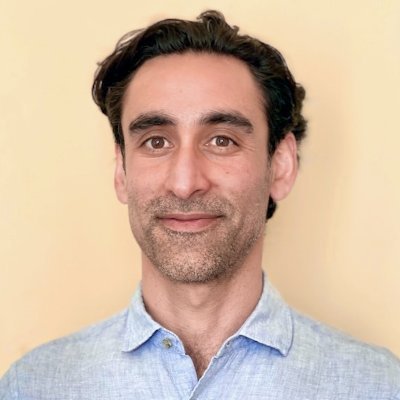 Rahmin SarabiRahmin Sarabi is the Founder and Director of the American Public Trust, with a mission to help Americans go beyond politics as usual to catalyze solutions on their biggest challenges and renew our systems of governance. His work in deliberative democracy includes contributions to the Michigan Citizens’ Panel on COVID-19, the Petaluma Fairgrounds Advisory Panel with Healthy Democracy, a novel integration of mini-publics with digital deliberative tools for the State of Colorado, and the lead role in the strategic planning for the international Democracy R&D network. He has spoken on democratic innovations to audiences organized by Stanford, MIT, the Berggruen Institute, and the International Association of Public Participation Professionals. He is a collaborative entrepreneur, human-centered designer, and strategist with a nearly 20 year background across social benefit startups and not-for-profit organizations. He is also a board member of the Co-Intelligence Institute.
Rahmin SarabiRahmin Sarabi is the Founder and Director of the American Public Trust, with a mission to help Americans go beyond politics as usual to catalyze solutions on their biggest challenges and renew our systems of governance. His work in deliberative democracy includes contributions to the Michigan Citizens’ Panel on COVID-19, the Petaluma Fairgrounds Advisory Panel with Healthy Democracy, a novel integration of mini-publics with digital deliberative tools for the State of Colorado, and the lead role in the strategic planning for the international Democracy R&D network. He has spoken on democratic innovations to audiences organized by Stanford, MIT, the Berggruen Institute, and the International Association of Public Participation Professionals. He is a collaborative entrepreneur, human-centered designer, and strategist with a nearly 20 year background across social benefit startups and not-for-profit organizations. He is also a board member of the Co-Intelligence Institute.
-
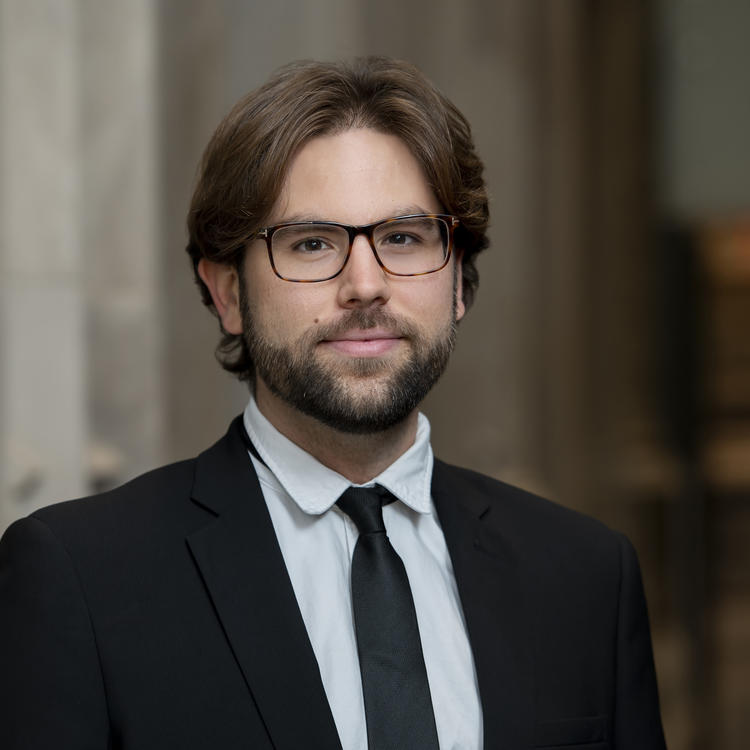 Dimitri CourantDimitri Courant is a Postdoctoral Research Associate and Fung Global Fellow at the Princeton Institute for International and Regional Studies (PIIRS), at Princeton University. He taught our Arendt Center Teacher Training program Doing Democracy Differently.
Dimitri CourantDimitri Courant is a Postdoctoral Research Associate and Fung Global Fellow at the Princeton Institute for International and Regional Studies (PIIRS), at Princeton University. He taught our Arendt Center Teacher Training program Doing Democracy Differently.
Courant received his Ph.D. in political science from the University of Lausanne and the University Paris 8. He is a democracy visiting fellow at the Ash Center, at Harvard Kennedy School. He holds two master’s degrees, in political science from Sciences Po Rennes, and in social sciences from the School for Advanced Studies in the Social Sciences. -
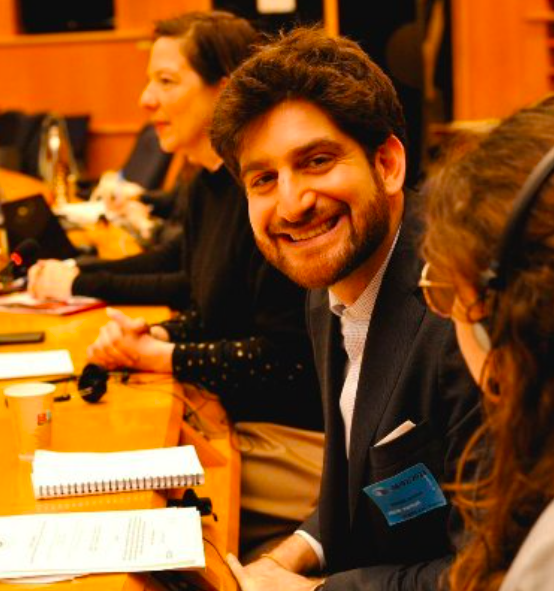 Jonathan MoskovicPassionate about deliberative democracy since attending the Irish Constitutional Convention on marriage equality (2011), Jonathan was actively involved at the G1000, of which he became the co-coordinator during a few years (2014-2019). In this context, he presented the process at various (inter)national conferences. In 2017, he designed the citizens' assembly for the Green Party in Belgium. Since November 2019, he is working as an advisor in democratic innovation for the president of the French-speaking Brussels Parliament, where he has the opportunity to lead the design, implementation and evaluation of the deliberative committees, a world première which brings together randomly selected citizens and parliamentarians on a permanent basis. With the experience he has acquired over the last ten years in the sector, Jonathan has accompanied the development of many major democratic innovations including: the first citizens' assembly in the Balkans (Montenegro) for the European Parliament, the permanent citizens' assembly in Paris, the permanent citizens' assembly on climate in Brussels, and the national agora on fair transition in Belgium). He is a member of the OECD's expert network on citizen participation.
Jonathan MoskovicPassionate about deliberative democracy since attending the Irish Constitutional Convention on marriage equality (2011), Jonathan was actively involved at the G1000, of which he became the co-coordinator during a few years (2014-2019). In this context, he presented the process at various (inter)national conferences. In 2017, he designed the citizens' assembly for the Green Party in Belgium. Since November 2019, he is working as an advisor in democratic innovation for the president of the French-speaking Brussels Parliament, where he has the opportunity to lead the design, implementation and evaluation of the deliberative committees, a world première which brings together randomly selected citizens and parliamentarians on a permanent basis. With the experience he has acquired over the last ten years in the sector, Jonathan has accompanied the development of many major democratic innovations including: the first citizens' assembly in the Balkans (Montenegro) for the European Parliament, the permanent citizens' assembly in Paris, the permanent citizens' assembly on climate in Brussels, and the national agora on fair transition in Belgium). He is a member of the OECD's expert network on citizen participation.
-
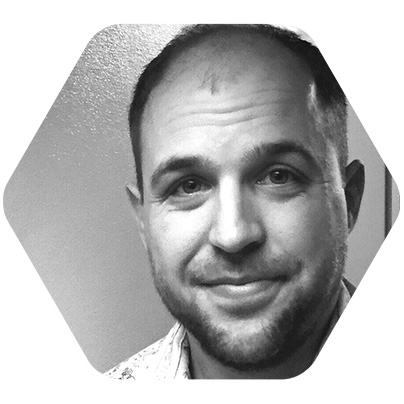 Linn DavisLinn co-leads program development and process design at Healthy Democracy, a US-based nonpartisan nonprofit that brings together everyday people – selected by democratic lottery – to tackle our toughest policy questions. He co-coordinates HD's complex public processes and consults on deliberative democracy projects in the US and abroad. Since joining Healthy Democracy in 2016, he has co-designed and -managed over a dozen of HD’s most groundbreaking lottery assembly projects. He holds a Masters in Urban and Regional Planning from Portland State University and a BA in History from Grinnell College. In his spare time, he plays music and volunteers as a fire lookout in the Central Oregon Cascades.
Linn DavisLinn co-leads program development and process design at Healthy Democracy, a US-based nonpartisan nonprofit that brings together everyday people – selected by democratic lottery – to tackle our toughest policy questions. He co-coordinates HD's complex public processes and consults on deliberative democracy projects in the US and abroad. Since joining Healthy Democracy in 2016, he has co-designed and -managed over a dozen of HD’s most groundbreaking lottery assembly projects. He holds a Masters in Urban and Regional Planning from Portland State University and a BA in History from Grinnell College. In his spare time, he plays music and volunteers as a fire lookout in the Central Oregon Cascades.
More Resources
In Canada, the organization MASS LBP has been offering Reference Panels as a service to help governments, public utilities and corporations make better decisions for over a decade. They also offer invaluable practical guides on the resources section of their website:
In the US, Healthy Democracy is based in Oregon and has pioneered the use of lottery-based deliberation around ballot initiatives.
The Sortition Foundation, with bases in the UK & Australia is a hub for knowledge about lottery based systems.
The OECD has published reports providing in-depth comparisons and an analysis of best-practices here.
In Europe, the Federation for Innovation in Democracy has led the charge in helping governments establish and institutionalized forms of deliberative democracy.
Participedia is a global network and crowdsourcing platform for researchers, policymakers and practitioners interested in public participation and democratic innovations
The blog Equality by Lot offers the most thorough ongoing round-up of discussion and information on lottery based democratic innovations activity around the world.




















